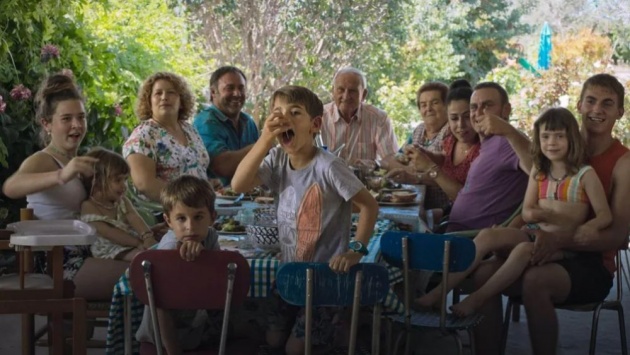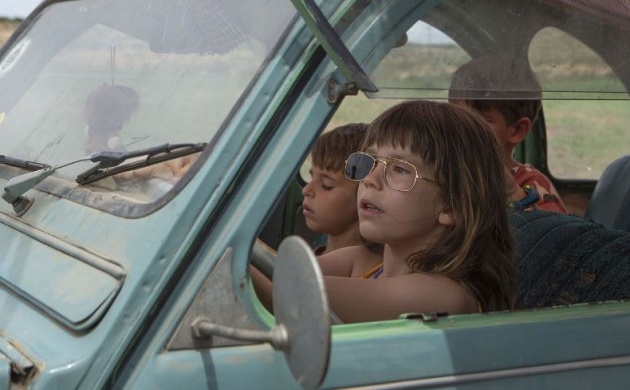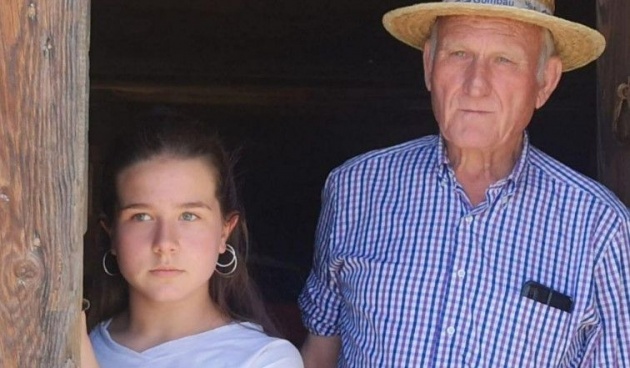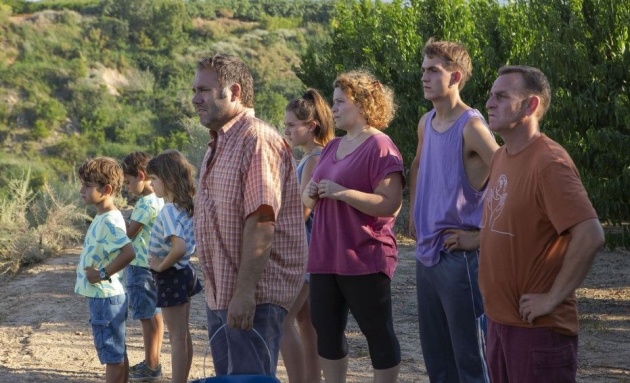
Pictured: The peach farming Solé family enjoy a meal in co-writer-director Carla Simón's Catalonia-set Golden Bear-winning drama, 'Alcarràs'. Still courtesy of Mubi (UK)
Alcarràs, co-writer-director Carla Simón’s 2022 Golden Bear-winning follow-up to her impressive 2017 debut feature, Estiu 1993, tackles a huge problem – the impact of globalization on small farmers, working constantly but barely eking a living. She does so through the microcosm of the extended peach farming family, the Solés, who live in the titular area, situated in the Catalunya province of Lleida. We observe the family as they harvest the last of their crops before the diggers are due to arrive, turning their tall groves into a solar farm. The family’s name is intentionally ironic.
In Estiu 1993, the action was mostly staged from the point of view of a young girl. In Alcarràs, co-scripted by Arnau Vilaró, Simón eschews the device of having a single principal viewpoint character. Her camera moves between family members, who variously court and thwart our sympathy – we observe the good and bad in each. There is no extra diegetic music to tell us how to feel, though music features occasionally, from the folk song taught to the family’s youngest member through the English language pop song to which the teenage daughter practices her dance moves, to the annoying sound of a flute played by a novice. The family aren’t openly tender with one another, but cumulatively, we feel their bond.
For lovers of Estiu 1993, the film begins from a familiar point. After an establishing montage of the fruit groves, we see six-year-old Iris (Ainet Jounou) and her identically dressed twin cousins, Pau and Pere (Isaac and Joel Rovira) playing in an abandoned blue Citroën Dyan car, their current den. Very much the leader, Iris imagines that she is piloting a spaceship. Heading for the sun, she asks for a pair of sunglasses of which one lens is missing that she puts on upside down. ‘More gasoline,’ she insists, pouring imaginary petrol from a green plastic watering can into the car’s dashboard. A noise from outside disturbs their play. They look out of the car window, on which we see ice cream wrappers where a tax disc might be. We don’t immediately see what has captivated their attention, but we hear the grinding of gears and a voice shouting, ‘children, get out of there’. Iris and the twins watch from a distance as the car is picked up by a mechanical crane. Iris immediately complains to her older sister Mariana (Xènia Roset) who is sitting on her own. They run back to the family home, past the drained swimming pool, to tell others. However, Iris’ family has much bigger concerns.
The stone-faced grandfather, Rogelio (Josep Abad) is sitting at a table in front of a pile of papers – bills, mostly, we casually discover - in a fruitless search for a document that proves that they own the land on which they farm. No such deed exists. As Rogelio explains, Old Pinyol, a landowner who was sheltered by the Solé family during the war, allowed the family to farm it as a gesture of his gratitude. However, he has died. Young Pinyol (Jacob Diarte) is repurposing the land as a solar farm. To resist this plan, the Solé family must produce a legal document. ‘It’s not what we did back then,’ Rogelio protests. Young Pinyol is spoken of disparagingly – he has a Romanian wife. There is the unspoken sentiment that the family – and the community – has been betrayed.
Quimet (Jordi Pujol Dolcet) berates grandfather for not safeguarding their future, though the family does own the house. He is uninterested in his youngest daughter’s cries about the car being taken away. Mariana, who asks to be taken into town, is also ignored. Also crowded around the table are Quimet’s wife, Dolors (Anna Otin), his sister Nati (Montse Oró) and brother-in-law Cisco (Carles Cabós). Despite their predicament, the family has a harvest to cultivate and trees, whose barks are wrapped in plastic, to protect. The next scene features Quimet, Cisco and Quimet’s son, Roger (Albert Bosch) driving at night firing at the rabbits who attack their crop. Quimet is half-resigned to the end of the family’s tenure and wants Roger to study. But farming is all Quimet knows. He throws himself into it, even at the expense of his health. Roger is a poor shot. The gun is passed to Quimet, whose aim is better. As the car stops, we see multiple rabbits – in the family’s eyes, a plague - dashing from one grove to another. It is one of the film’s more vivid images.

Pictured: Iris (Ainet Jounou) in the driver's seat in a scene from the Catalonia-set farming drama, 'Alcarràs' co-written and directed by Carla Simón. Still courtesy of Mubi (UK)
While Roger idolizes his father, he also respects his uncle Cisco. Together Roger and Cisco grow marijuana – we hear that a lot of young people do so, and it is a profitable business. Quimet, though, is a traditionalist, albeit one who is aware of profit margins. Coming into town, he can only afford to hire two fruit pickers from the African migrant population who seek work. Dolors brings Mariana to help but Quimet makes it clear that he prefers men to pick fruit. At any rate, Iris is a nuisance to him, using one of the fruit crates placed on its side as a new den; Quimet furiously reappropriates it. ‘It’s for the fruit,’ he tells her as he drags it away and turns it right side up.
We learn about each member of the family through small vignettes. Mariana joins two friends on the top of a hill to practice synchronized dance moves for (as we discover) an upcoming festival. Roger walks into town and dances at a local tavern, cigarette in mouth, virtually dancing on the spot. Music and dance displace conversations with other people; they represent an escape from farming life, or at least a way to de-stress.
Quimet is only ever seen at work on the farm or in the house or delivering his crop to the co-operative. At the latter, he is asked to join a protest. He says he won’t and asks Roger to help him secure a load.
Iris continues to be a free-spirited nuisance. In the film’s most amusing scene, she is berated by her father for playing with machinery. ‘How did the key get in there?’ We don’t immediately see what the problem is until the crane is lowered with Pau cowering in the scoop of a digger. When the scoop reaches the ground, Pere and Iris rush to meet him, helping him out. ‘What was it like?’ asks Iris excitedly. ‘It was scary,’ quivers Pau. Quimet cannot control his youngest daughter, frequently shouting at her, and doesn’t give her praise. When extremely irritated, he asks Dolors to deal with her. In another scene, Iris, Pere and Pau play in a neighbour’s vegetable patch, throwing cabbages at one another and helping themselves to watermelons. As punishment, they have to clear out a barn. Roger poses a different problem. Quite apart from growing marijuana in secret, he doesn’t always remember to divert the stream from the Solés’ farm to the neighbouring land. The following day, their land is soaking wet. Dolors insists that the sun will dry it out.
Rogelio is convinced that he can persuade Young Pinyol to change his mind by gifting produce. First, he gives him a basket of fruit and vegetables after Young Pinyol visits to offer Quimet a job on the solar farm. Quimet refuses, claiming that he is too old to re-train. ‘You’re not that old,’ Young Pinyol tells him. After he leaves, Quimet removes a solar panel from a building. Dolors laments his pettiness. Later, with Iris, Rogelio delivers some figs, picked from the tree that Old Pinyol himself had planted. They travel to the town centre to deliver them. We notice the varnish on the panels of the door to Young Pinyol’s house as well as the foreign woman who takes the figs from Rogelio. Often, we see Rogelio deep in thought. His face has an extraordinary stillness as if frozen. Later on, we see him play cards in a local café, where he tries to execute his alternative plan, obtaining land from a neighbouring farmer. ‘Why don’t you bet your land?’ Rogelio asks him. The farmer explains that he has sold it already. A lot of the farms have been bought up.

Pictured: Mariana (Xènia Roset) and her grandfather Rogelio (Josep Abad) in a scene from the Catalonia-set farming drama, 'Alcarràs', co-written with Arnau Vilaró and directed by Carla Simón. Still courtesy of Mubi (UK)
It is strange that though Quimet protests his fate, he does not actively fight it, with Rogelio demonstrating more agency. ‘Why don’t we bring Pinyol some dead rabbits?’ he says at one point, an idea that is turned into a final act of protest by Roger and Mariana. Quimet’s response is martyrdom, but he expects his brother-in-law to share his values. Cisco does not do so. While out shopping for produce, asking Mariana not to lean on it, Dolors sees Cisco and Nati speaking to Young Pinyol. ‘Don’t tell your father,’ Dolors tells Mariana. ‘Why?’ Mariana asks. When solar panels are being installed, Quimet sees Cisco with the workers. He explodes with anger at the betrayal. Nati collects her two sons. Iris no longer has cousins to play with.
In the bathroom, Dolors kneads Quimet’s back. Iris is bathing. Mariana is doing her nails. ‘Can you pass me your father’s cream?’ Dolors asks Mariana. ‘Why can’t Iris?’ ‘She’s having her bath.’ Mariana picks up the cream with her teeth and carries it over to her mother. ‘You make things so difficult,’ Dolors tells her.
Though their circumstances are grim, the family is not. There is a joyous open-air meal, during which the family poses for a photograph. Quimet prepares snails for eating, lining them up and then covering them with hay that is then set on fire. The fire is then extinguished. The snails are ready to eat. ‘You won’t get this anywhere else,’ Quimet boasts proudly. He is a little too proud; Mariana doesn’t want second helpings. There is an awkward moment when they frolic around their swimming pool as family members are pushed in fully clothed, including Quimet. Quimet pulls his brother-in-law into the water. Cisco is not best pleased.
Though Quimet argues with Cisco, it doesn’t last, though when Quimet discovers the marijuana plants and burns them, Roger, who observes this, is furious, pulling out the water gate to deliberately flood the land. He gets drunk in town and doesn’t come home. Cisco fetches Roger from a bar, carrying a huge stuffed toy. ‘It won’t go in,’ he says, trying to pass the toy through a set of bars in Cisco’s truck. With the land even more saturated with water, Quimet is furious, trying to place Iris’ muddy shoe on her foot. When Cisco is brought back, Dolors walks up to him and slaps his face. She also slaps Quimet’s face. This is all that needs to be said.
Having watched others in the co-operative on television taking part in a demonstration – they remark how one neighbour looks fat - Quimet and Roger do join a protest. Produce is deliberately dumped, then squashed by a lorry before being thrown at a banner. As in many of the scenes, Simón keeps her camera on the Solé family before we see what they are reacting to. The supermarket where they are making their protest may be symbolic of the problem faced by farmers, but I felt sorry for the supermarket workers under siege, who are only employed by the company implementing price cuts. The scene represents a change in Quimet’s outlook, seeing himself allied to a wider group. In earlier scenes, we sense that he is embarrassed by the need to protest, as if hard work and prudence will receive its own recognition.
The film boasts two emotionally powerful moments. First when Rogelio teaches his granddaughter Iris a song that she later performs at a family show – a second joyous family scene – that becomes the film’s mournful refrain, ‘la canço del pandero’, historically a song performed during Corpus Christi but also improvised by women bringing in the harvest. (‘If the sun was a daily worker, it would not rise so early. If the marquis had to harvest, we would have died of hunger.’) The family show has Iris, Pere and Pau perform for the family, Iris dressed as a boy and the twins dressed as girls. ‘Isn’t that mum’s blouse?’ one family member asks. Iris dedicates the song to Rogelio. He joins in. Iris’ love of the song is instinctive and unquestioning. She doesn’t ask about its meaning. The second powerful moment is a casual one. Iris is reunited with Pau and Pere. She invites them, with their toy guns, into her new den. ‘You’ve been very busy with the war,’ she tells them as if they have just come in from a shift at the factory. She then tends to the twins as the Solé family once tended for Old Pinyol, with unquestioning kindness. Quimet finds her. ‘I lost a tooth,’ she tells him as she emerges from her new den.
Both Iris and Rogelio want to create a new reality. Iris constantly searches for new play areas – she has energy and agency. Rogelio encourages Quimet to buy land that is reportedly for sale; Quimet claims not to have the money to do so. By contrast, Mariana falls out with her friends and doesn’t perform at the show; her song also involves guns and a pistol gesture.
Although the film pays tribute to Catalan tradition and is spoken in local dialect, it also speaks of other displaced cultures, when a farm worker, noting that Iris has discovered a dead rabbit, sprinkles grass and a small amount of gravel and says a prayer, presumably commuting the animal’s soul to the afterlife. Iris imitates this but can’t get the words right. The film is, by its nature, an illustration of tradition commuted into memory, Simón documenting the practices of Catalan farmers. Alcarràs ends more or less at it begins, with the camera on the Solé family as they witness destruction, in this case, cranes tearing up the fruit groves. Once more, Simón withholds showing what they see until it becomes almost an act of cruelty not to show it. The audience join the Solé family in lamentation.

Pictured: The Solé family witness the end of their way of life in the finale of the Catalonia-set farming drama, 'Alcarràs', co-written and directed by Carla Simón. Still courtesy of Mubi (UK)
Reviewed at London Film Festival, Friday 8 October 2022, Picture House Central, Shaftesbury Avenue, 09:30am press screening. and at Curzon Canterbury, Screen Three, Saturday 7 January 2023, 20:30 screening
See also Larry Oliver's review of 'Estiu 1993' on Bitlanders



